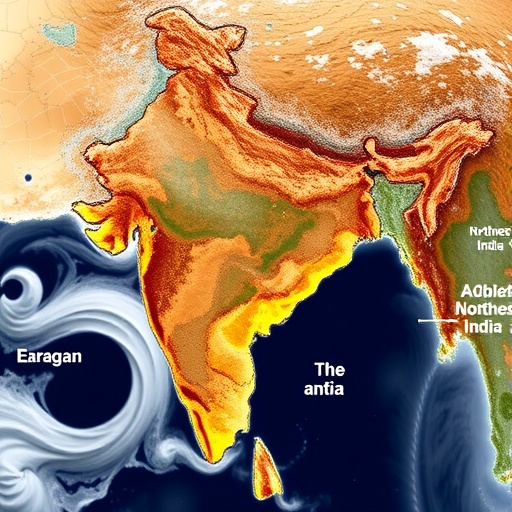In an increasingly volatile climate landscape, the scientific community is striving to enhance our understanding of meteorological droughts, especially in vulnerable regions. A recent study conducted in Northwest India, led by researchers Y. Kumar, S. Singh, and A. Kumar, focuses on an innovative risk assessment approach using copula-based methods. This study is significant not just for its technical contributions but also for its implications on water resource management and agricultural sustainability in a region that heavily relies on monsoonal rainfall.
Meteorological drought is a complex phenomenon characterized by a prolonged period of below-average precipitation. In Northwest India, these droughts have profound impacts on agriculture and water supply, affecting millions who depend on these essential resources. Traditional methods of assessing drought risk often fall short in accurately representing the interdependencies among various climatic factors. In contrast, this study employs copula functions to model and analyze the joint distribution of meteorological variables, allowing a more nuanced understanding of drought risk.
The researchers meticulously collected a comprehensive dataset of climatic variables over several decades. This dataset, which includes temperature, precipitation, and humidity figures, provides a robust foundation for the statistical analyses they conducted. By utilizing copula models, the team was able to capture not only the marginal distributions of individual variables but also their dependencies, providing a multi-dimensional perspective on drought dynamics.
One of the crucial aspects of this research is its ability to quantify drought risk more effectively than traditional approaches. By adopting a copula-based framework, the team revealed that the likelihood of drought occurrences in Northwest India is significantly influenced by the concurrent variability of multiple meteorological factors. This insight leads to a more refined risk assessment, presenting an opportunity for regional policymakers to formulate more adaptive management strategies.
The study outlines various scenarios depicting potential future drought conditions, informed by projections of climate change. As temperatures rise and monsoonal patterns shift, the implications for water resource management in Northwest India become increasingly urgent. The researchers emphasize the necessity for forward-looking approaches that consider both current conditions and anticipated changes. This necessitates a paradigm shift in how drought risk is evaluated and managed, especially in a region already grappling with significant water stress.
One particularly striking finding from the study highlights the increase in the frequency and intensity of drought events in Northwest India over recent decades. This trend is alarming and poses a severe threat to both agricultural production and water availability. The researchers provide evidence that this pattern will likely further accelerate under climate change scenarios, potentially leading to drastic socio-economic repercussions if appropriate measures are not implemented.
Moreover, the research also suggests an inherent non-stationarity in the climate data, implying that past averages may no longer serve as reliable indicators for future conditions. The implications of this finding cannot be overstated; it calls for continuous monitoring and reassessment of drought risks rather than relying on historical data alone. This dynamic nature of climate variables underscores the necessity for adaptive management frameworks in water-scarce regions like Northwest India.
The use of copula functions also opens new avenues for further research. While this study provides a solid foundation, the researchers point out that it could be expanded by incorporating additional variables such as soil moisture and groundwater levels. By including more parameters into the copula models, they advocate for a more holistic understanding of hydrological cycles in the region.
Additionally, the findings resonate beyond just academic circles. The insights gleaned from this research could be instrumental for local agricultural communities. By understanding the risk factors associated with drought onset, farmers can be better prepared to adapt their practices. For instance, early warning systems based on real-time meteorological data could be established, allowing for timely interventions to safeguard crop yields.
In a more extensive context, the implications of this research touch upon global discussions regarding climate resilience and sustainable development. Countries worldwide facing similar climatic challenges can glean valuable lessons from the methodologies and findings presented in this research. Adapting these statistical frameworks may enhance drought risk assessment in other vulnerable regions, ultimately fostering a more resilient agricultural sector on a global scale.
Furthermore, this study contributes to the broader discourse on the intersection between climate change and human rights. Access to water is a fundamental human right, and improved drought risk assessments can directly influence water availability and distribution. This research advocates for integrating climate science into policy-making processes, ensuring that vulnerable populations are not left to suffer the disproportionate effects of climate variability.
In conclusion, Kumar, Singh, and Kumar’s research marks a significant advancement in the understanding of drought dynamics in Northwest India. By employing copula-based methodologies, they provide a fresh perspective on meteorological risk assessment, laying the groundwork for better-informed policy decisions. As the climate crisis intensifies, such pioneering research will undoubtedly play a critical role in shaping responses to drought and ensuring the sustainability of vital resources in the years to come.
Subject of Research: Drought Risk Assessment in Northwest India Using Copula Models
Article Title: Copula-based meteorological drought risk assessment in Northwest India
Article References:
Kumar, Y., Singh, S. & Kumar, A. Copula-based meteorological drought risk assessment in Northwest India.
Environ Sci Pollut Res (2025). https://doi.org/10.1007/s11356-025-37013-y
Image Credits: AI Generated
DOI:
Keywords: Drought, Copula, Risk Assessment, Climate Change, Water Resources Management, Northwest India, Meteorological Variables, Agriculture.




